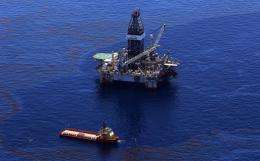BP warns of long effort to cap spill

BP officials warned they may not be able to stop the Gulf of Mexico oil leak until August, as Louisiana residents warned the spill could wipe out dozens of fish species.
Drilling relief wells is still seen as the best solution, but they will not be completed for at least eight weeks, BP spokesman John Currie told AFP, as US officials warned the spill is now the worst environmental disaster to ever hit the United States.
BP engineers are scrambling to prepare their next bid to stop the oil from gushing into the sea, using robotic submarines to cut off a burst pipe and then capping it and siphoning the oil up to surface vessels.
Although local media said the "cut and cap" procedure was under way, Currie said the effort was unlikely to begin before Wednesday.
US officials and residents remained frustrated over the lack of progress.
Interior Secretary Ken Salazar was on his eighth trip to the Gulf region and "emphasized the need to find an immediate, short-term solution to contain the leaking oil," according to a statement from the joint command center.
"US government scientists, engineers and experts have been working with independent experts and BP officials on a variety of alternatives to contain the flow of oil immediately."
At least 20 million gallons of oil are feared to have already flooded into the Gulf since the Deepwater Horizon rig exploded on April 20 killing 11 people and sank into the sea two days later.
More areas of Louisiana reported oil washed ashore Monday, extending the scope of the disaster.
US officials Monday expanded a fishing ban in the Gulf of Mexico by more than 1,000 square miles (2,600 square kilometers) amid a spreading oil slick.
Some 61,854 square miles (160,200 square kilometers) of Gulf of Mexico waters are now closed to fishing, the National Oceanic and Atmospheric Administration (NOAA) said. That area is close to the size of Tunisia.
BP's last attempt to stop the leak, dubbed "top kill," failed on Saturday, leaving an estimated 12,000 to 19,000 barrels of oil belching into the Gulf every day.
The still-growing slick is threatening Louisiana's fragile wetlands, as well as the Gulf region's fishing and tourism industries.
With hurricane season starting Tuesday, residents fear oil could be pushed up onto the Florida, Texas, Mississippi and Alabama coastlines when storms roll through the area.
Former shrimper turned tugboat captain Kevin "Godzilla" Curole told AFP, "This is going to kill more species of fish than BP even knows exist, and it will kill our whole way of life.
"People used to come here to fish. But now they're going to come here to look at a memorial to what is going to be an extinct way of life and tell their kids: 'See? Those are fishermen. They're the people who built this town and southern Louisiana,'" he said at his home in this fishing town on Lafourche Bayou.
Two separate studies, by Louisiana State University and the University of Florida, have found large plumes of oil hanging underneath the water.
"These plumes will make it very difficult for fish to survive in the northern margins of the Gulf. We may very well lose dozens of vulnerable fish species," Prosanta Chakrabarty, a fish scientist at Louisiana State University, told AFP.
The pancake batfish, a species that Chakrabarty discovered six months ago and was due to introduce to the world in August in a report in a scientific journal, was among the species under threat.
"Unfortunately, by August the oil spill will have leaked scores of millions of gallons of oil into their habitat, as well as a million gallons of toxic dispersant," he said, fearing the batfish might not live long enough to be formally recognized as a species.
Meanwhile, BP warned that fraudsters saying they were employees of the British oil company were taking advantage of the economic plight brought on by the spill and "offering applicants training and promising job placement for a fee.
"This is a scam. BP does not charge to train and hire applicants," said Neil Chapman, a spokesman for the oil company.
Thousands of fishermen have been forced by the spill to leave their boats in port during peak fishing season, as state officials shut down prime fishing grounds.
Currie said BP has been paying up to 3,000 dollars a day to out-of-work fishermen and others who are able to prove they have been impacted by the crisis.
But on Monday, staff at a restaurant in Galliano told AFP their claims for compensation had been rejected because, although their hours have been cut since the crisis broke, they had recently been given a pay rise.
Other angry Louisiana residents slammed BP's efforts to stop the leak as being just a well-managed show.
"It's all just smoke and mirrors," New Orleans resident Danielle Brutsche told AFP.
(c) 2010 AFP





















